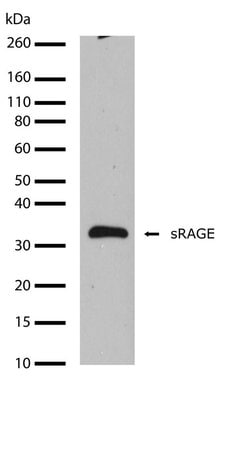Learn More
Invitrogen™ RAGE Recombinant Rabbit Monoclonal Antibody (17H19L10)
Rabbit Recombinant Monoclonal Antibody
Supplier: Invitrogen™ 701316
Description
This antibody is predicted to react with chimpanzee, equine, non-human primate and porcine based on sequence homology. Intact IgG appears on a non-reducing gel as ~150 kDa band and upon reduction generating a ~25 kDa light chain band and a ~50 kDa heavy chain. Recombinant rabbit monoclonal antibodies are produced using in vitro expression systems. The expression systems are developed by cloning in the specific antibody DNA sequences from immunoreactive rabbits. Then, individual clones are screened to select the best candidates for production. The advantages of using recombinant rabbit monoclonal antibodies include: better specificity and sensitivity, lot-to-lot consistency, animal origin-free formulations, and broader immunoreactivity to diverse targets due to larger rabbit immune repertoire.
The Receptor for Advanced Glycation End-products (RAGE) is a gene located on human chromosome 6p21.3, encoding a transmembrane receptor belonging to the immunoglobulin superfamily. RAGE is expressed in various tissues, with significant levels in the lungs, and plays a crucial role in cellular signaling and inflammation. As a receptor, RAGE binds multiple ligands, including advanced glycation end-products (AGEs), amyloid-β peptide, high mobility group box 1 (HMGB1), and S100/calgranulin proteins, facilitating diverse pathological processes like inflammation, cancer progression, and neurodegeneration. The interaction between RAGE and its ligands triggers intracellular signaling pathways such as NF-?B activation, leading to inflammatory responses and oxidative stress. In the context of chronic diseases like diabetes, Alzheimer's, and cardiovascular diseases, RAGE is a critical mediator, linking metabolic disturbance to cellular dysfunction. Therapeutic targeting of RAGE signaling is under investigation, aiming to mitigate its contribution to inflammatory and degenerative diseases.
Specifications
| RAGE | |
| Recombinant Monoclonal | |
| 0.5 mg/mL | |
| PBS with 0.09% sodium azide | |
| Q15109 | |
| AGER | |
| Recombinant protein corresponding to amino acids 23-342 of human sRAGE. | |
| 100 μg | |
| Primary | |
| Human | |
| Antibody | |
| IgG |
| Western Blot | |
| 17H19L10 | |
| Unconjugated | |
| AGER | |
| advanced glycation end product receptor; advanced glycation end-product receptor; advanced glycation end-products receptor; advanced glycosylation end product-specific receptor; advanced glycosylation end product-specific receptor variant 2; advanced glycosylation end product-specific receptor variant 3; advanced glycosylation end product-specific receptor variant 4; advanced glycosylation end product-specific receptor variant 5; advanced glycosylation end-product specific receptor; Ager; MAPK/MAK/MRK overlapping kinase; MOK; MOK protein kinase; RAGE; RAGE isoform NtRAGE-delta; RAGE isoform sRAGE-delta; RAGE/AGER; RAGE1; RAGE-1; RAGE-4 ORF3; receptor for advanced glycation endproducts; receptor for advanced glycation end-products variant 20; receptor for advanced glycosylation end products; receptor of advanced glycosylation end products of proteins; immunoglobulin superfamily; MHC class II; MHC class III; renal cell carcinoma antigen; renal tumor antigen 1; SCARJ1; sRAGE; STK30 | |
| Rabbit | |
| Protein A | |
| RUO | |
| 177 | |
| Store at 4°C short term. For long term storage, store at -20°C, avoiding freeze/thaw cycles. | |
| Liquid |
Safety and Handling
Your input is important to us. Please complete this form to provide feedback related to the content on this product.
